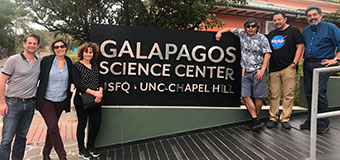Exploring possibilities of linking and joint work with the center led by the San Francisco de Quito University and the University of North Carolina at Chapel Hill, is the objective of the visit by a delegation from the university led by the VicePresident for Research Affairs.

Located in the middle of the Pacific Ocean, a thousand kilometers off the coast of Ecuador, are the Galapagos Islands. Declared a World Heritage Site for their rich biodiversity, which even inspired naturalist Charles Darwin to establish his theory of evolution and natural selection. Sea turtles, dolphins, sharks, whales, coral reefs, iguanas, lizards, sea lions and penguins, are some of the many species that inhabit this archipelago.
On the island of San Cristóbal is the Galapagos Science Center (GSC), a joint research center between the San Francisco de Quito University (USFQ) and the University of North Carolina at Chapel Hill (UNC). Its objective is to produce scientific research that allows greater knowledge about the islands, promote the conservation of this fragile ecosystem and advocate the social development of the community in a sustainable way.
Seeking forms of joint collaboration was the objective of the visit made to Ecuador by a UC delegation led by the Vice-President for Research Affairs, Pedro Bouchon; the Director of the Research Affairs Office, María Elena Boisier; the Dean of Biological, Sciences Juan Correa; the Director of the Coastal Station for Marine Research, Sergio Navarrete; and the academic of Political Science, Juan Pablo Luna. They also met with a delegation from the University of North Carolina.
In addition to the research work conducted by the San Francisco de Quito University, the Vice-President for Research Affairs, Pedro Bouchon, especially notes “the great capacity they have had to link internationally with other institutions, to generate new knowledge and exchange opportunities for undergraduate and graduate students”. Likewise, for UC this represents a valuable opportunity to be part of this “network of networks”, not only on issues of ecology and biodiversity, but also in data analysis, mathematical modeling, social sciences and other areas.
In fact, as the academic Juan Pablo Luna explains, “there is much to be done to understand demographic, social and political keys to the transformation of the archipelago, as well as in terms of the design of institutions for managing the tensions and conflicts that are beginning to be set up in Galapagos today. It can be an interesting model to analyze similar processes in the Chilean insular territory, as well as in regions of continental Chile with similar population, productive and socio-political dynamics ”.
The delegation from both universities were received by USFQ President, Carlos Montufar, in Quito. The meetings addressed topics for potential joint work, such as ecology, science and engineering for development, and programs to promote public policies and culture, among others. The delegations also had the opportunity to visit in the field the research carried out at the Galapagos Science Center, which is framed in seven lines of study: human-environmental interactions; Marine ecology; marine mammals and birds; terrestrial ecology; microbiology; conservation, sustainable development and management; and earth sciences.
“The research work developed by the San Francisco de Quito University in Galapagos is impressive, along with the degree of internationalization that they have achieved in all their work, which represents an opportunity to explore collaborative spaces for joint projects, academic internships and exchange of students in different disciplines ”, comments the Director for Research Affairs Office, María Elena Boisier.
Natural laboratory for research
Galapagos is a privileged place for studies in biodiversity, evolutionary ecology and conservation of terrestrial and marine environments. As Dean Juan Correa explains, “the island system is characterized by having a great diversity of plants, invertebrates, reptiles, birds and mammals, most of them endemic, which transforms the Galapagos Science Center into a place that attracts the work of scientists and students from all over the world”.
“Galapagos is paradise for any marine biologist or evolutionary ecologist,” says academic Sergio Navarrete. “We have a lot to learn from their experience, but I also believe that we can contribute significantly to the preservation of this world heritage of humanity.” In this sense, the Network of Regional Centers and Stations – RCER UC, can be a great contribution to this type of research.
See images of the visit (https://flic.kr/s/aHsmGpxQKh)